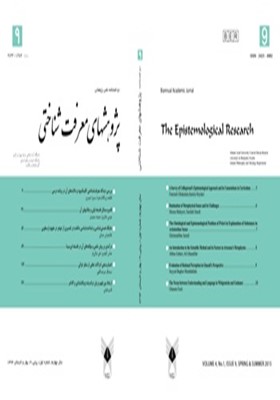ارتباط بین فهم و زبان دراندیشه ویتگنشتاین و گادامر
محورهای موضوعی : پژوهشهای معرفت شناختی
1 - دکترای فلسفه، دانشگاه آزاد اسلامی، واحد علوم و تحقیقات
کلید واژه: گفتگو, زبان, فهم, فهم دیگری,
چکیده مقاله :
ویتگنشتاین متأخر و گادامر معتقدند فهم متضمن کاربرد است. در اندیشه آنها، حضور ِدیگری در فهم راستین نمایان می شود. ویتگنشتاین برآن است که ما نمیتوانیم هیچ شکل زندگی خاصی را مستقل از شکل های دیگر زندگی بفهمیم. گادامر نیز می گوید من نسبت به گفته های دیگری گشوده است، زیرا گفتگوی واقعی فقط با چنین گشودگیای میسر می شود. از دیدگاه ویتگنشتاین، اساساً داشتن زبان خصوصی برای انسان مقدور نیست، زیرا قواعد حاکم بر کاربرد واژه های مبین حسیات، قواعدی همگانی و اجتماعیاند. ما این قواعد را در صحنهجامعه و در گفتگو با دیگران یاد می گیریم و بهکار میبندیم. نزد گادامر نیز زبان محیطی است که در آن، دو طرف گفتگو به فهم متقابل میرسند و ویژگی هر گفتگوی راستین این است که دو طرف گفتگو برای دیدگاه و گفتههای یکدیگر ارزش قائل باشند.
The later Wittgenstein and Gadamer believe that the understanding requires the function. Accordingly, the presence of other is given in the true understanding. Wittgenstein has said that the understanding of the specific form of life without the understanding of the other form of life is impossible. According to Gadamer “I” open up to the other dialogues, because the real dialogue will be possible by this opening up. Having private language is not feasible as Wittgenstein has said, since the rules dominating on the usage of words which explain the sensual things, are universal and social. We are learning and applying these rules in the society talking to each other. In Gadamer view, the language is an environment in which the both sides of dialogue can achieve mutual understanding. The characteristic of the real dialogue is that the both sides of dialogue must respect each other points of view.
آدرنو، تئودور (1384) دیالکتیک روشنگری، ترجمه مرادفرهادپوروامیدمهرگان، تهران: گامنو.
برلین، آیزایا (1385)مجوس شمال،ترجمه رضا رضایی، تهران: نشرماهی.
حسینی، مالک (1388) ویتگنشتاین و حکمت، تهران: هرمس.
رورتی، ریچارد (1386) فلسفه و امید اجتماعی، ترجمه عبدالحسین آدرنگ و نگار نادری، تهران: نی.
روبینز، آر.اچ. (1387)تاریخ مختصر زبانشناسی، ترجمه علیمحمدحقشناس،تهران: کتاب ماد.
شمس، منصور (1384)آشنایی با معرفتشناسی، تهران: طرح نو.
فن، ک.ت. (1381) مفهوم فلسفه نزد ویتگنشتاین، ترجمه کامران قرهگزلی، تهران: نشر مرکز.
گادامر، هانس گئورگ (1384) آموزه قرن،ترجمه محمود عبادیان، تهران: اختران.
لویناس، امانوئل(1387)اخلاق و نامتناهی، ترجمه مراد فرهادپور و صالح نجفی، تهران: فرهنگ صبا.
ویتگنشتاین، لودویک (1381) پژوهشهای فلسفی، ترجمه فریدون فاطمی، تهران: نشر مرکز.
-----. (1383/ 1387)در باب یقین، ترجمه مالک حسینی، تهران: هرمس.
-----. (1384)برگهها، ترجمه مالک حسینی، تهران: هرمس.
-----. (1386)رسالهمنطقیـفلسفی، ترجمه میرشمسالدین ادیبسلطانی،تهران: صراط.
-----. (1385) کتاب آبی،ترجمه مالک حسینی، تهران: هرمس.
Arnswald, U. (ed.) (2002) Gadamer Century: Essays in Honor of HansGeorg Gadamer, Massachusets: Institute of Technology.
Gadamer H. G. (1977) Philosophical Hermeneutics, trans. By David Linge, Berkeley: University of California.
-------.(1994) Truth and Method, translation revised by Joel Weinsheimer and Donald G. Marshal, New York: Continuum.
Glock Hans-Johann (1996) A Wittgenstein Dictionary, Oxford: Wiley-Blackwell.
Grayling, A. C. (1988) Wittgenstein, Oxford and New York: Oxford University Press.
Habermas, Jurgen (1984) The Theory of Communicative Action, Vol. I, Reason and Rationalization of Society, trans. Thomas McCarthy, Boston:Beacon Press Boston.
Heidegger, Martin (1956) What is Philosophy, trans. William Kluback and Jean T. Wilde, London: Vision Press.
Humboldt, W. von (1971) Linguistic Variability and Intellectual Development, translated by George C. Buck and Frithjof A. Raven, Florida: University of Miami Press.
Jaspers, Karl (1953) The Origin and Goal of History, London: Routledge.
Lawn, Chris(2006) Wittgenstein and Gadamer: Towards a Post-analytic Philosophy of Language, London: Continuum.
Taylor, Charles (2002) “Gadamer On Human Scienses”, in The Cambridge Companion to Gadamer, edited by Robert J. Dostal, Cambridge: Cambridge University Press, pp.126-142.
Weinsheimer, Joel (1985) Gadamer`s Hermeneutics, A Reading of Truth and Method,New Haven and London:Yale University Press.
Wittgenstein, Ludwig (1956) Remarks on Foundation of Mathematics, Oxford: Basil Blackwell.

